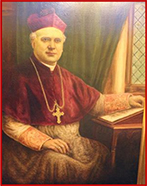Early Bishops of Portsmouth
Written by Dr. Paul Severn
Reviewed by Monsignor Canon Nicholas France MBE
(former Vicar General of the Portsmouth Diocese)
The story of our diocese is the story of our bishops. For in every case their leadership created a particular form of cultural Catholicism and guided us in how to be a Diocesan Church in fidelity to the Pope. This book marks the different eras in which from small beginnings they led the Diocese of Portsmouth.
Over the years I have visited the graves of each of our bishops. Their place of rest indicates where they found their inspiration and fulfilment. Thus, Bishop Vertue is buried in a public cemetery within city of Portsmouth, as was appropriate for a man who had a distinguished career in both the Royal Navy and in becoming our first Bishop. Bishop Cahill is buried with his two brothers in the churchyard of his beloved Ryde, a parish to which he had devoted a great many years of his life. Bishop Cotter was laid to rest among his favourite Irish nuns in their cemetery in Waterlooville. Later, Bishop King was buried in the ancient Catholic cemetery of St James in his beloved Winchester.

We should be most grateful to Dr Paul Severn for the research he made into early Bishops of Portsmouth, which has led to the creation of this small book about their lives. Sometimes it must be difficult to ascertain historical truth from diocesan anecdotal stories. The latter can be amusing, but not very helpful, if you are looking for true information about how our diocese and parishes developed from small beginnings under Bishop Vertue to far a greater consolidation by the end of the long reign of Bishop Cotter.

I knew something of the story of Bishop Vertue from my years as bishop secretary while living in Bishop’s House, Portsmouth. More interesting for me was the story of Bishop Cahill and the long occupation by bishops of the Presbytery at Ryde. I had long been intrigued by the photographs in Bishop’s house of the Bishop Cahill’s coffin being taken back to Ryde on a steamer. I was impressed that the clergy continued solemn liturgy on-board, while relieved to know that it wasn’t a commercial ferry, with ordinary passengers kept below decks! I believe I can understand how Bishop Cahill “said he had become a bishop too late in life”, as he believed he was past his physical prime, even though he achieved much in Portsmouth and beyond in founding of new parishes. I wonder how he would have felt when one of his successors pull down the baldachino in the cathedral and opened up the sanctuary for a new kind of sacred liturgy?
I have spent many hours of my life, firstly as a young priest and secondly as an old Canon, looking at the portrait of Bishop Cotter in the Aula of Bishop’s House, smiling at the thought of the mischievous interpretation of his motto ‘Non recuso laborem’ as ‘I never turn down a good job’! Well, this Irish nationalist did a good and faithful job over many years in his English diocese. It is always been said that he did not accept candidates for the priesthood who were English. Perhaps this was because the diocese was without money and he could not afford to send students to English seminaries but to places like All Hallows in Dublin where the fees nominal?

I could make the observation after reading this book that perhaps, surprisingly, the first four bishops were friends of each other and thus chosen to succeed each other. I wonder whether the practice of a diocesan priest being made an auxiliary bishop before succeeding to the See, might enable more continuity and safeguarding of diocesan tradition than the practice since that first half of our diocesan history of our bishops being plucked from elsewhere, however admirable they have been?
I commend the reading of this book to all, who would like to know more about the foundation stones of our beloved diocese.
Nicholas France
The booklet is available from the Isle of Wight Catholic History Society.
Please email iow-chsREMOVE@outlook.com
The booklet costs £4-00. With postage & packaging it is £6-00.
Cheques (payable to “IoW Catholic History Society”)
may be sent to the society at 72, Mayfield Road, Ryde, Isle of Wight, PO33 3PR
or (preferably) the money may be transferred directly into the society bank account:-
HSBC Sort Code 40 – 39 – 17
Acc. No. 21373749
Please label the transfer EBOPS and your surname.